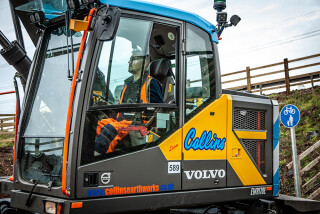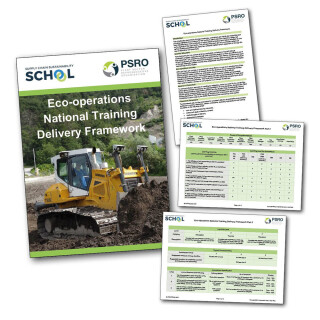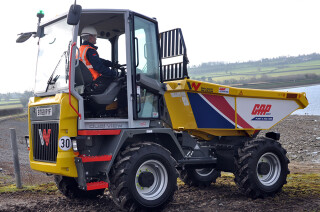
[ad_1]
Development gear at the moment is cleaner and extra fuel-efficient than ever earlier than. For the reason that first European emissions requirements for non-road cell equipment had been formulated 26 years in the past, emissions from development plant have steadily lowered, as has gasoline consumption.
Pushed primarily by more and more stringent Euro emissions requirements, engine producers have refined their know-how to the purpose that tailpipe emissions have been slashed by an estimated 97% since 1999.
Rising stress from shoppers additionally signifies that clear machines at the moment are thought-about a prerequisite for any main venture – for instance, HS2 now insists that every one plant on its websites should be powered by engines conforming to no less than Euro Stage IV.
However there may be one necessary think about machine financial system and emissions that’s past the management of the engine producers: the operator within the cab.
Unskilled or inefficient machine operation can vastly have an effect on gasoline consumption and engine emissions, and no quantity of technical refinement can compensate for a slipshod operator. And since this introduces a human issue, the answer needs to be behavioural – and that requires coaching.
So when you may suppose you’re a talented and skilled plant operator, you might need extra to be taught earlier than you turn out to be a sustainable one.
As in each different sector of the development {industry}, the plant sector is looking for methods to navigate to web zero and gear utilization has been recognized as a big contributor to carbon-based emissions.
Finally, the purpose is to switch all carbon-emitting gear with zero- or low-emission options. However that’s nonetheless a way off so within the meantime the purpose is to scale back engine-derived emissions so far as practicable by minimising engine run-time and inspiring the environment friendly use of the gear.

To allow this, the Plant Sector Consultant Organisation (PSRO – a pan {industry} group representing employers) and the Provide Chain Sustainability College’s (SCSS) Plant Group have printed what is actually a ‘nationwide curriculum’ for coaching operators in low-emission plant utilization.
The Eco-operations Nationwide Coaching Supply Framework is designed to offer an academic programme from which coaching programs (delivered both in-house by the employer, or by externally licensed programs from established awarding organisations) might be derived.
Some employers already practice their operators in strategies that can scale back gasoline consumption, minimise tailpipe emissions and enhance effectivity. However this coaching varies extensively in each scope, high quality and effectiveness, says Peter Brown, PSRO chairman and technical supervisor on the Development Plant-hire Affiliation (CPA).
“CITB presents an eco-operator course – albeit centered on machine operation slightly than the problems and results of emissions – and several other producers I consider additionally supplied them, albeit product-specific,” he says.
He provides: “In essence, the issue was consistency in that programs being devised had no overarching topical content material to base them on and guarantee relevance to the plant and development actions. The existence of the framework and the consistency it supplies additionally signifies that (and we’re discussing this with them for the time being) it will possibly assist employers meet CITB grant standards.”
PSRO and SCSS developed the framework by constructing on a coaching programme that had already been collectively developed by CPA members Flannery Plant Rent and L Lynch Plant Rent. The unique intention was to refine this right into a standardised curriculum for eco-operations coaching however, says Brown, “the scope expanded and extra standards had been added – resembling evaluation strategies, durations, coach standards and so forth. It was felt higher to be in a framework format to offer the pliability however holding a degree of consistency.
“It was Flannery who had been beginning to develop an in-house course with which CPA turned concerned, together with Lynch, [but] the content material wasn’t primarily based on any overarching or industry-agreed syllabus,” continues Brown. “This was the purpose at which we felt one was wanted, therefore the work to develop what turned the framework, the partnering with the SCSS and utilizing the experience of their plant group.”

The brand new framework units out parameters for constant supply and supplies steering on areas resembling core and elective studying outcomes, supply content material and methodologies, evaluation methods and course durations.
As the educational content material can fluctuate relying on the trainee’s particular occupation, the framework additional identifies particular person course content material and supply elements for various teams together with plant operatives, supervisors, plant managers, web site managers, planners, plant procurers and upkeep personnel.

The purpose is that on completion of a course primarily based on this framework, delegates ought to have attained a minimal degree of understanding of the rules of decreasing machine-based carbon emissions, enabling them to recognise and apply realized discount strategies, operational processes and rising machine applied sciences. The PSRO/SCSS hope that by studying, analysing and understanding, every delegate will take private possession of the necessity to scale back emissions.
The framework is split into three components with half one outlining the goals and rules of the framework, half two figuring out the supply facets for the related occupations and half three specifying the educational outcomes and coaching specification.
Half two of the framework outlines a collection of instructed course varieties, each primarily based on the core occupation or self-discipline of the trainee. The programs will probably be primarily theory-based, utilizing a mix of debate, demonstration and displays.
As the educational consequence and scope of coaching could also be comparable for various totally different occupations, the framework outlines how these is perhaps mixed right into a single course. It suggests the next programs:
- Plant Operative/Plant Supervisor (Introductory)
- Plant Operative (Superior) and Lead Plant Operative
- Plant Supervisor/Plant Supervisor (Superior).
Superior programs are meant to construct on the educational derived from the introductory programs, both following on from the introductory course or forming a part of a mixed course.
Half two of the framework additionally supplies steering on instructed course durations. Ideally, programs needs to be accomplished in a single session and embody an evaluation on the finish. But when the course is cut up into separate classes, further time needs to be added to offer a verify on prior studying. The place programs have been mixed, further studying time is recommended and, for exterior funding functions, coaching suppliers might have to extend durations to fulfill funding guidelines, says Brown.
These delivering the coaching might want to maintain a recognised instructing, coaching or assessor qualification or be working in the direction of one. They have to even have had related development web site expertise – the framework requires no less than two years – together with the operation, supervision or planning of a spread of frequent varieties of development plant.
Trainers will probably be anticipated to show that they’ve ample data of development plant operations at or above the extent they’re instructing in addition to a data of engine emissions and the impact they’ve on the setting. A data of plant and gear upkeep necessities can be important.
On completion of the coaching course, delegates will obtain a certificates figuring out the kind of course, date of completion and particulars of each the delegate and their employer. The certificates also needs to carry the assertion “Course content material primarily based on the PSRO/SCSS Eco-operations Nationwide Coaching Supply Framework” to forestall repeat programs of the same nature.
“[The framework] will assist be sure that future coaching programs on this matter each cowl the related industry-derived content material and supply a platform for the consistency for the coaching of plant and site-based occupations although this open-source framework,” says Brown.
Imogen Participant, senior sustainability advisor and plant class group lead at SCSS, provides: “For the constructed setting to significantly deal with local weather change and scale back emissions, then the influence that good operator behaviour has should be correctly realised. The publication of the Eco-operations Nationwide Coaching Supply Framework is nice and I’m excited for it to paved the way ahead for best-practice coaching.”

Bought a narrative? Electronic mail information@theconstructionindex.co.uk
[ad_2]
